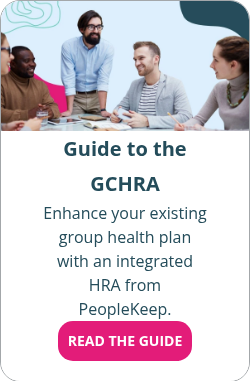What is an EBHRA?
By Holly Bengfort on January 16, 2024 at 3:50 PM
With the rising cost of healthcare, an increasing number of employers are turning to options like health reimbursement arrangements (HRAs) to provide quality health benefits on a budget.
In recent years, the excepted benefit HRA (EBHRA) has emerged as one choice for employers who want to help offset employees’ out-of-pocket health costs. However, many people still have questions about what an EBHRA is and how it works.
In this article, we'll explain what an EBHRA is, how it differs from other HRAs, and why it may be a valuable option to consider for your organization.
Takeaways from this blog post:
- The excepted benefit HRA (EBHRA) is an option employers can leverage to supplement an existing group health plan.
- An EBHRA allows employers to reimburse their employees for premiums paid towards certain excepted benefits and other eligible out-of-pocket medical care expenses.
- EBHRAs differ from other HRAs in terms of annual contribution limits, reimbursable expenses, and eligibility requirements for employers and employees.
What is an EBHRA?
The EBHRA is a type of HRA that provides employers with a way to cover employees’ out-of-pocket medical expenses. EBHRAs supplement traditional group health plans by allowing employers to reimburse their employees for additional coverage their group plan doesn’t include.
Organizations of any size with employer-sponsored group health plans can offer EBHRAs. Employees don't have to enroll in the group plan to participate; you just need to offer them coverage.
The EBHRA is a relatively new type of benefit. President Donald Trump signed Executive Order 13813 in 2017, asking the U.S. Departments of the Treasury, Health and Human Services, and Labor to find new ways to expand HRAs. In 2018, the departments proposed new regulations1, creating the individual coverage HRA (ICHRA) and the EBHRA. The EBHRA became available starting in 2020.
How does an EBHRA work?
Through an EBHRA, you can reimburse your employees tax-free for premiums paid towards certain excepted benefits and other eligible out-of-pocket medical expenses listed in Internal Revenue Code § 213(d) and determined by the employer.
It's also important to note that health insurance plan premium reimbursement isn't allowed for individual coverage, traditional group health insurance, or Medicare. However, you can reimburse premiums related to COBRA or continuation coverage.
What are "excepted benefits?"
According to the Affordable Care Act (ACA), "excepted benefits" refer to benefits traditional health plans don’t cover.
Excepted benefits include:
- Dental insurance premiums
- Vision insurance premiums
- Cancer insurance premiums
- Workers compensation insurance
- Non-health coverage
- Accident-only coverage
- Limited health benefits
- Long-term care benefits such as nursing home care
- Short-term limited-duration insurance (STLDI)
- Specific disease or illness coverage
- Hospital Indemnity
- Supplemental health benefits
- Cost sharing, such as copays, deductibles, and other healthcare expenses not covered by a primary plan
How does an EBHRA compare to other HRAs?
Let's go over some similarities and differences between the EBHRA and a few other common HRA types.
|
Plan type |
Excepted benefit HRA (EBHRA) |
Group coverage HRA (GCHRA) |
Individual coverage HRA (ICHRA) |
Qualified small employer HRA (QSEHRA) |
|
Annual contribution limit |
Employers can contribute an annual allowance amount of $2,200 for 2026. Employers can allow unused funds to carry over annually. |
GCHRAs have no annual limit on contributions. |
ICHRAs have no annual limit on contributions. |
For 2026, the annual maximum for a QSEHRA is $6,450 for self-only employees and $13,100 for employees with family coverage. |
|
Reimbursable expenses |
EBHRAs can reimburse excepted benefits and eligible out-of-pocket expenses, as set by the employer. |
GCHRAs can reimburse all eligible out-of-pocket expenses listed in IRC § 213(d), except for insurance premiums. |
ICHRAs can reimburse individual health insurance premiums and eligible out-of-pocket expenses. |
QSEHRAs can reimburse health insurance premiums and eligible out-of-pocket expenses. |
|
Eligible employers |
Any employer with W-2 employees that offers a group health insurance plan. |
Any employer with W-2 employees that offers a group health insurance plan. |
Any employer with W-2 employees. Employers can offer an ICHRA to employee classes they don’t offer group health insurance to. |
Any business with fewer than 50 full-time equivalent employees (FTEs) that doesn't offer group health insurance coverage. |
|
Eligible employees |
Any employee offered group health plan coverage can participate. Employees don’t need to participate in the group plan. |
Only available to employees enrolled in the group health insurance plan. |
An employee must have a qualified individual health insurance plan with minimum essential coverage (MEC) to participate. Employers can then structure eligibility based on 11 different employee classes, such as part-time and full-time employees. |
All full-time W-2 employees are eligible for the benefit. Employers can also choose to include part-time employees. |
|
Tax benefits |
Reimbursements are tax-free. |
Reimbursements are tax-free. |
Reimbursements are tax-free. |
Reimbursements are tax-free for employees with MEC. |
How does an EBHRA benefit employers?
According to our 2024 Employee Benefits Survey Report, 81% of employees say an employer’s benefits package is an important factor in whether or not they accept a job. On top of that, health coverage is the most desired employee benefit.
Therefore, EBHRAs can be a valuable tool for employers looking to enhance their benefits package and provide additional support for their employees' healthcare needs. By offering reimbursement for a wide range of eligible expenses, employers can help alleviate some of the financial burden associated with healthcare costs.
Additionally, the flexibility of EBHRAs allows employers to customize their benefits package to better meet the needs of their workforce. Also, any unused funds stay with the employer.
How does an EBHRA benefit employees?
Employees don't want a big chunk of their paycheck to go toward medical care and other healthcare needs. When you offer them an EBHRA, you ensure that more of their hard-earned money stays in their pockets. The EBHRA bridges medical expenses and a traditional group coverage health plan by allowing employees to allocate funds toward their out-of-pocket medical costs.
The EBHRA also enhances employee benefits for a healthier workforce. With an EBHRA, employees have access to more comprehensive coverage options. Excepted benefits include things like dental and vision coverage, long-term care coverage, and nursing home care. These aren't often covered under traditional health insurance plans but can be important aspects of overall healthcare needs.
When your employees can take care of their health, they're less likely to get sick and miss work. Plus, having healthy employees can lead to a potential decrease in insurance claims and annual health plan premiums over time.
Conclusion
An excepted benefit health reimbursement arrangement (EBHRA) offers employers the opportunity to provide additional benefits to their employees. With its exemption from certain federal rules and its flexibility in reimbursement options, an EBHRA can help enhance a company's benefits package and support the healthcare needs of its employees.
If an EBHRA isn't the right fit for your organization, you have several other HRAs to choose from. If you're interested in offering a QSEHRA, ICHRA, or GCHRA to your employees, PeopleKeep can help! Our personalized benefits administration platform makes it easy to set up and manage your HRA in minutes each month.
1. https://www.federalregister.gov/documents/2019/06/20/2019-12571/health-reimbursement-arrangements-and-other-account-based-group-health-plansCheck out more resources
See these related articles

Examples of common small business employee benefits
Just because your organization is small doesn't mean you can't offer quality benefits. Here are some examples of common benefits that employees love.

Veterinary clinic employee benefits
Explore veterinarian benefits tailored for clinic staff. Discover how to offer flexible, affordable employee benefits that support retention and care teams.

What is an administrative services only (ASO) benefit plan?
Learn what an administrative services only (ASO) benefit plan is and how it allows businesses to self-fund employee benefits with third-party support.



